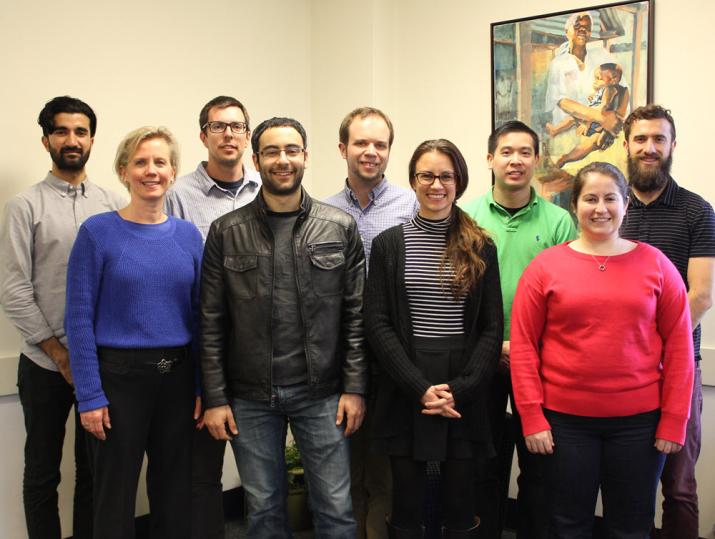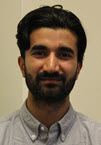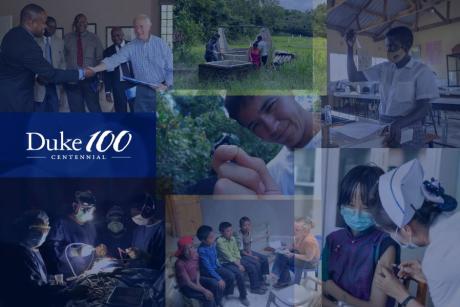
Eight of the 12 current doctoral scholars pose for a photo with Kathy Sikkema, director of doctoral studies (second from left).
Published March 22, 2016, last updated on September 13, 2016 under Education News
Three Duke doctoral students—Faraz Usmani, Christopher Lam and Justin Lana—have been selected to join the Global Health Doctoral Scholars program at the Duke Global Health Institute (DGHI). Lam and Lana are graduates of the Duke Master of Science in Global Health program.
The doctoral scholars program gives Duke PhD candidates from multiple disciplines an opportunity to conduct research on a topic that straddles their primary discipline and global health.
Each scholar is mentored by a DGHI faculty member, who collaborates with the scholar on planning and executing global health research and provides career development and other opportunities to help the scholar prepare for a career in global health.
“Adding to our interdisciplinary synergy in global health, we look forward to further expanding our environmental and economics perspectives and welcome the contributions made by biomedical engineering,” said Kathleen Sikkema, director of doctoral studies at DGHI. “As our first cohorts of doctoral scholars receive their PhDs, we are extremely pleased to continue to build our community of global health scholars.”
Faraz Usmani Studies Uptake of Environmental Health Technologies
 Faraz Usmani began his PhD program in environmental economics with Duke’s University Program in Environmental Policy in 2014. He specializes in the economics of environmental health, energy access and development in low-income countries and is interested in the socioeconomic obstacles that hinder the large-scale adoption and sustained use of new environmental health technologies by poor households.
Faraz Usmani began his PhD program in environmental economics with Duke’s University Program in Environmental Policy in 2014. He specializes in the economics of environmental health, energy access and development in low-income countries and is interested in the socioeconomic obstacles that hinder the large-scale adoption and sustained use of new environmental health technologies by poor households.
After graduating from New York University, Usmani worked in the Indian Ministry of Health’s HIV/AIDS control program, where he managed a $25 million grant from the Global Fund. He went on to complete a master’s degree in international and development economics at Yale University, and before heading to Duke to pursue a doctoral program, he spent two years working on environmental management projects at the World Bank.
Usmani is working with Marc Jeuland, assistant professor of public policy and global health, to study the effect of economic incentives and other decision-making factors on the adoption and sustained use of improved cookstoves in Cambodia. He also intends to develop a manual, informed by his interdisciplinary research, that will help environmental health policymakers and practitioners translate innovative research findings into effective programs and initiatives.
Usmani was recently named to the Duke University Energy Initiative’s inaugural class of Energy Doctoral Student Fellows. As a fellow, he’ll work with industry leaders and Duke faculty to conduct interdisciplinary research on energy markets and policy.
“The environmental health challenges that interest me don’t exist in isolation,” Usmani said, “so I’m thrilled to develop my research agenda through engagement with the interdisciplinary DGHI community.”
Christopher Lam Looks to Increase Accessibility of Cervical Cancer Screening
 Currently a fourth-year doctoral student in biomedical engineering, Christopher Lam is a 2012 graduate of the Duke Master of Science in Global Health (MSc-GH) program. His combined interest in global health and biomedical engineering blossomed during his undergraduate involvement with Engineers without Borders; through this group, he and his team designed and developed a water purification system for a community in Tanzania.
Currently a fourth-year doctoral student in biomedical engineering, Christopher Lam is a 2012 graduate of the Duke Master of Science in Global Health (MSc-GH) program. His combined interest in global health and biomedical engineering blossomed during his undergraduate involvement with Engineers without Borders; through this group, he and his team designed and developed a water purification system for a community in Tanzania.
For his MSc-GH thesis, Chris worked as a visiting fellow at the George Institute for Chronic Diseases in China, where he evaluated the burden of hypertension and the effectiveness of a dietary salt substitute intervention in reducing hypertension in an elderly pastoralist Tibetan population.
Through his global health work in China, Lam recognized the tremendous need for design and deployment of low-cost, easy-to-use point-of-care diagnostic devices. Under the guidance of his faculty mentor, Nimmi Ramanujam, professor of biomedical engineering and global health, he’s currently evaluating and developing a low-cost transvaginal digital colposcope or POCkeT (Point of Care) colposcope that will allow for increased dissemination of cervical screening in limited-resource settings. Pilot field study sites include Liga Contra El Cancer in Lima, Peru, and the Kilimanjaro Christian Medical Center in Moshi, Tanzania.
Lam’s doctoral scholar funding will enable him to expand the scope of this project; his goal is to improve the sensitivity and specificity of the POCkeT colposcope, which interfaces with a smartphone or tablet. He’s also working with DGHI research scholar Lavanya Vasudevan to incorporate the control software and image processing algorithms in the Android operating system associated with the miniature colposcope.
“Through the support of the Doctoral Scholars program,” Lam said, “I’m now able to get valuable data points from the field to refine and improve upon our lab’s POCkeT colposcope design to ensure clinicians have a robust and intuitive new tool in the fight to increase access to cervical cancer screening.”
Justin Lana Investigates Risk Factors for a Neglected Tropical Disease
 Like Christopher Lam, Justin Lana is a 2012 graduate of the Duke MSc-GH program. He’s pursuing a PhD in Environment at the Nicholas School of the Environment.
Like Christopher Lam, Justin Lana is a 2012 graduate of the Duke MSc-GH program. He’s pursuing a PhD in Environment at the Nicholas School of the Environment.
While at DGHI for his master’s degree, Lana spent seven months in northern Peru working on his thesis under the mentorship of assistant professor of global environmental health William Pan. Following graduation, Lana worked briefly in Pan’s lab as a senior data technician before taking a 14-month position in South Sudan working as a technical advisor with the South Sudan Guinea Worm Eradication Program.
And now, Pan is once again mentoring Lana. Last summer, Lana joined Pan’s Bass Connections team in Peru, which explored the epidemiology of cutaneous leishmaniasis (CL), a neglected tropical disease transmitted by sandflies. For his dissertation project, he’ll build on this research, evaluating risk factors of CL infection using epidemiological, environmental and clinical approaches.
Specifically, Lana will test the primary hypothesis that artisanal and small-scale gold mining and deforestation are associated with an increased risk for CL infection. The study will leverage long-term partnerships between Pan’s research team, trained field workers, Peruvian medical professionals and the Ministry of Health in the Madre de Dios region.
Lana was recently named a 2016 Emerging Leaders in Science and Society Fellow with the American Association for the Advancement of Science.
“I truly believe global health is a lifestyle as much as it is a serious academic discipline, and as a doctoral scholar I plan to build on both fronts,” said Lana. “The program’s financial support will strengthen my research by allowing me to stay in Peru longer. And as a member of this program, I’m instantly connected with like-minded individuals from whom I can receive feedback and support as I move through this PhD journey.”
Learn more about the Global Health Doctoral Scholars program.


